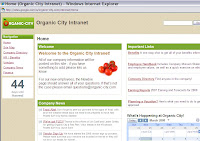 If there are two names that are creating a buzz in the mobile world today, they have to be "google android" and "iphone sdk". Both are aiming at providing young developers with free tools to design their own mobile applications, and also make some money off it! Both are backed by big tech giants, and both are ready to go to extreme lengths to woo the people, especially young talented developers. Its pretty interesting to see how people react to this unending competition; for some, it may actually create several opportunities to showcase their talents and get some serious attention!
If there are two names that are creating a buzz in the mobile world today, they have to be "google android" and "iphone sdk". Both are aiming at providing young developers with free tools to design their own mobile applications, and also make some money off it! Both are backed by big tech giants, and both are ready to go to extreme lengths to woo the people, especially young talented developers. Its pretty interesting to see how people react to this unending competition; for some, it may actually create several opportunities to showcase their talents and get some serious attention!With all of that money floating around, developers are rushing to build the next big widget, social network, or mapping technology for the mobile phone. Not only are developers lured by the idea of making money on the mobile phone, but they're also drawn by financial incentives coming from both camps that might seal their future.
Howard Chau, for example, has been developing a mobile application that's designed to alert people to their next calendar appointment, factoring in data like the person's physical location and traffic conditions en route to a meeting. In the next two weeks, Chau plans to submit the GPS-based application, called Mappily, to Google in the hopes of winning its Android Developer Challenge, a developer contest with $10 million in total prize money. Because Chau only stands to win tens of thousands of dollars in the first round of the challenge, the money would just be gravy. But Chau is not the only one contesting for it; apparently, this talent hunt has created quite a buzz, challenging and ispiring Silicon Valley's developers to create the hottest new mobile technology applications.
So who's pulling all these strings? Well, besides Google and Apple in a simmering battle in the handset market with respective new platforms and software development kits, venture capitalists, such as KPCB (with $100 million iFund for iphone apps) and Charles River Ventures(likely to fun Android apps) are also involved. Google's Android Developer Challenge is its own version of the iFund at a 10th the size. But surely other VCs are ruminating on forming the Android Fund to rival KPCB.
For many developers, Apple's iPhone is more alluring as a development platform because of the established customer list. Craig Hockenberry, CTO at IconFactory and a longtime Mac developer, said the iPhone offers a clear business path.(His company is developing a Twitter messaging tool called Twitterific for the iPhone, among other applications) "We just want to build small, fun apps and leave it at that. Those are the ideal apps for the iPhone." As for the Android contest, he quotes that "It's a bit of a gamble as there's no hardware yet. You can maybe make a million dollars, but what if you don't? You have nothing. I think what we have going onto the iPhone, it's going to sell.
On the other hand, Hank Williams company Kloudshare(develops an application that will help people manage data on their phone and desktop) aims to enter the Android contest. "The idea that Google's putting $10 million on the table to give it to the best companies by this deadline is more direct in my mind. I would imagine Google will write more checks than the Kleiner folks."
So while Apple seems to have the advantage of an established product, Android seems to be a developer's choice as the platform is easier to create applications for because of built-in mapping intelligence technology and so-called background processing. That's why Chau chose the Android platform, for its in-build mapping technology. Ultimately, it all ends on who succeeds in enticing the mass as well as the talent; but with such huge chunks of money on the market, it sure is an exciting race to witness!!
Read more!


















